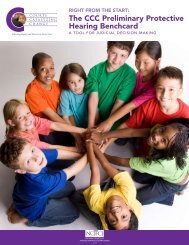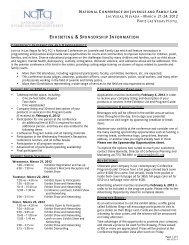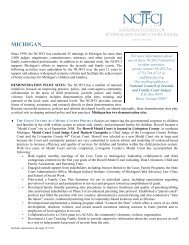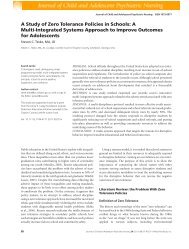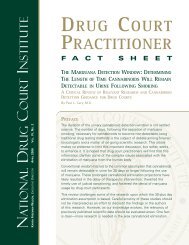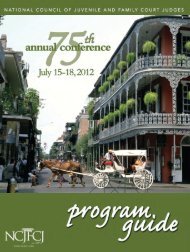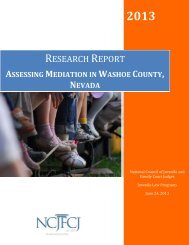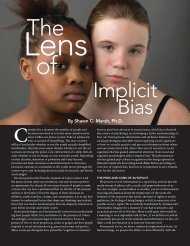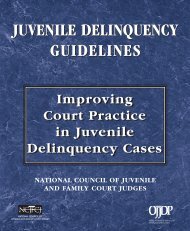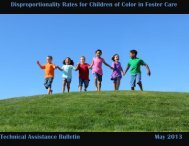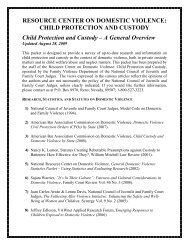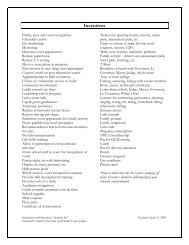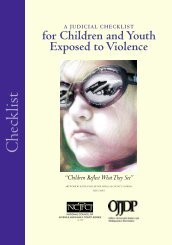dowNload - National Council of Juvenile and Family Court Judges
dowNload - National Council of Juvenile and Family Court Judges
dowNload - National Council of Juvenile and Family Court Judges
You also want an ePaper? Increase the reach of your titles
YUMPU automatically turns print PDFs into web optimized ePapers that Google loves.
RECENT PROGRAMS<br />
Attendees gather at the NCJFCJ’s 2nd New York Child Abuse <strong>and</strong> Neglect Institute at Pace Law School.<br />
Civil Protection Orders Training<br />
In mid-September, the NCJFCJ convened two days <strong>of</strong> multi-disciplinary<br />
trainings in Western Oregon on its Civil Protection Orders: A<br />
Guide for Improving Practice (CPO Guide). These collaborative trainings<br />
were made possible because <strong>of</strong> the judicial leadership <strong>of</strong> NCJFCJ<br />
Board Member Judge Katherine Tennyson. The trainings were<br />
designed with stakeholders from Oregon’s tri-county area, including<br />
Portl<strong>and</strong>, to improve the protection order process through multidisciplinary<br />
collaboration. They were developed around the needs <strong>of</strong><br />
the three jurisdictions that participated in the trainings. Judge Sue<br />
Carbon, past NCJFCJ President <strong>and</strong> former director <strong>of</strong> the Office on<br />
Violence Against Women, served as a key faculty member, along with<br />
NCJFCJ member Judge Berryl Anderson, who also co-chairs the CPO<br />
Guide Implementation Committee.<br />
The format <strong>of</strong> the day-long trainings intentionally provided<br />
opportunities for inter-disciplinary dialogue. Participants included<br />
judges, law enforcement <strong>of</strong>ficers, civil attorneys, prosecutors, advocates,<br />
court staff, <strong>and</strong> probation <strong>and</strong> parole <strong>of</strong>ficers. Many participants<br />
agreed that the training session increased their underst<strong>and</strong>ing <strong>of</strong> the<br />
differing roles played by the system’s various stakeholders. The sessions<br />
also prompted interest in further multi-disciplinary training <strong>and</strong><br />
dialogue to enhance awareness <strong>of</strong> gaps <strong>and</strong> opportunities for increased<br />
collaboration.<br />
Topics covered during the two trainings included assessing danger<br />
<strong>and</strong> lethality <strong>and</strong> examining best practices for enforcement <strong>of</strong> civil<br />
protection orders. Participants learned to better identify <strong>and</strong> apply<br />
dangerousness/risk assessment in domestic violence cases, <strong>and</strong> to<br />
recognize <strong>and</strong> respond to changes in dangerousness/risk as the victim<br />
navigates the civil justice system. Attendees also addressed the<br />
importance <strong>of</strong> ensuring access to the civil justice system by enhancing<br />
their cultural awareness. Additionally, participants learned the value <strong>of</strong><br />
increased communication between different pr<strong>of</strong>essionals involved in<br />
the protection order process.<br />
The NCJFCJ looks forward to working further with stakeholders in<br />
the tri-county area around Portl<strong>and</strong> who plan to continue a multidisciplinary<br />
approach to improving the protection order process in<br />
their jurisdictions<br />
<strong>Court</strong> Training <strong>and</strong> Improvement Program<br />
On September 11 <strong>and</strong> 12, 2012, the NCJFCJ provided a two-day,<br />
multi-disciplinary educational program in Detroit for Wayne County,<br />
Michigan judges, attorneys, <strong>and</strong> custody evaluators. In 2010, Wayne<br />
County received a <strong>Court</strong> Training <strong>and</strong> Improvement Program grant<br />
from the Department <strong>of</strong> Justice, Office on Violence Against Women<br />
(OVW). This grant allowed Wayne County to invite the NCJFCJ to<br />
their jurisdiction to provide education on domestic violence in court<br />
cases. Among the faculty were NCJFCJ members Judge Andrew<br />
Crecca <strong>and</strong> <strong>Court</strong> <strong>of</strong> Appeals Justice Amy Ronayne Krause.<br />
Twenty-two judges <strong>and</strong> referees trained together on the first day<br />
while 28 court attorneys <strong>and</strong> 12 custody evaluators were trained<br />
simultaneously. On the second day, both groups came together. All<br />
participants increased their knowledge <strong>of</strong> the impact <strong>of</strong> domestic<br />
violence <strong>and</strong> left with a better underst<strong>and</strong>ing <strong>of</strong> how domestic violence<br />
dynamics affect the decision-making <strong>and</strong> courtroom appearance <strong>of</strong><br />
victims <strong>and</strong> perpetrators.<br />
Topics provided the context in which the violence <strong>and</strong> controlling<br />
behavior occurred <strong>and</strong> the impact <strong>of</strong> domestic violence on children.<br />
Detroit, Michigan<br />
12 JUVENILE AND FAMILY JUSTICE TODAY | WINTER 2013



